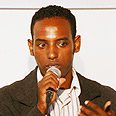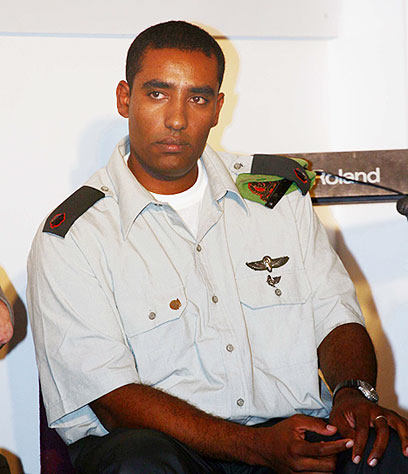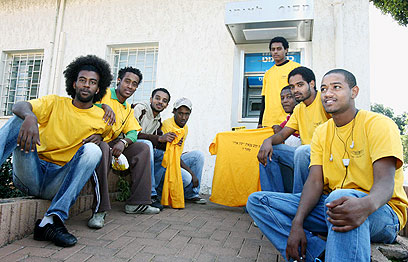
Ethiopians tackle community violence
Community convention hears frank soul seeking by members of Ethiopian community; ‘Every Ethiopian man is a potential police case,’ activist says
The meeting, held in Emek Hefer on Wednesday evening, was organized by Tebeka, an advocacy group working for "equality and justice" for Ethiopian Israelis.
Addressing the issue of violence within the Ethiopian community, activist and author Gadi Yevarken, whose sister was murdered by her husband, called on the community to take it upon itself to end the violence. "We need to be more self critical as a community. We need to take it upon ourselves," Yevarken said.

Under fire in Lebanon: Shlomi Biche (Photo: Amonon Gutman)
"This violence does not come from Ethiopia," he added, saying that the violence was a result of a culture of suspicious gossiping among the community, causing baseless allegations of extramarital affairs. "I saw her there, I saw here, drinking coffee with him' - This gossip must end. It is very dangerous," Yervaken said.
The activist also charged the government of dealing with violence in a "cosmetic way," and said that the issue needed treatment "from the roots."

'This violence does not come from Ethiopia' (Photo: Amnon Gutman)
"If there are 100 (Ethiopian) families living in Jaffa for example, how can one social worker deal with all of them?" he asked, calling on more community social workers to be made available. "This violence is a difficult phenomenon. All of us must speak out against it."
Erez Halfon, Director-General of the Ministry of Absorption, said the government was making funds available to increase resources. "Two weeks ago, nearly NIS 7 million (USD 1.6 million) has been made available for the national Ethiopian project," Halfon told Yerkaven. "We are deep in this struggle, as everyone knows," he added.
Yerkaven said relations between the Ethiopian community and the police were strained. "Every Ethiopian man is a potential police case," he added. "When there are suspicions of violence… the police simply open a case, rather than dealing with the root cause. That's not dealing with the problem," Yevarken said receiving applause.
Representing the police, Nurit Ziv, Head of the Crimes Victims Division, said: "We must deal with complaints given to us. If we don't, we will be accused of not taking care of the problem. Once we get a complaint, we won't abandon those complaining and function independently. We work with the families."
Bridging the culture gap
The conference also tackled the cultural gaps which may be an underlying cause of the violence. Avinesh Tasma, a lawyer, said: "The rate of violence in our community is said to be the same as that in general society. If that's true, why are we the highest risk group?"
"I've never seen women's rights group work with abused Ethiopian women," said Tasma, adding that the problem was viewed as an Ethiopian issue, rather than general domestic violence.
Ricky Tegba, an educational advisor, and member of the Coalition of Ethiopian Women for the Prevention of Domestic Violence, spoke of the cultural reversals that left men helpless in their new country. "Many women have become conscience, they now have jobs. This could be a factor in violence. The order in home has been reversed, the man is unemployed. He has lost his absolute power. The man who attacks is actually a victim of this whole system," she said. "They didn't tell them what country they were going to. That in this country hitting is against the law. There's a very large cultural gap. This should be explained in the first years they come," Tegba added.
"If you want to end violence in the family, first start respecting our parents," said Reuven Menashe, a member of the audience. Menashe accused the government of spoiling a social order that worked for thousands of years in Ethiopia. "Our parents raised us for 2,500 years. Without police, without lawyers, or any outside help. If someone's guardians died, the aunt would raise them. That's how we were educated," Menashe said.
"In this country, every government ministry poisons members of community. You are making the problem worse. The problem is the government. There are racist people, they have a heart of stone. Our children don't eat their parents food, because they are told it's not kosher. That's how you are educating them. This has to change first of all," he added.
Speaking to Ynetnews, Yevarken said that despite the problems encountering the community, in 20 – 30 years, Israeli Ethiopians "had huge potential" to flourish and become veteran Israelis, "if we receive the needed support."
"I believe a large part of the community will flourish, and some will lead the country," he added.
The convention also heard from Ethiopian Israelis who are climbing into senior positions within the IDF, such as Company Commander Major Shlomi Biche, who was injured in his leg during an operation against Hizbullah in the second Lebanon war. "I was trained to do this, what I did was not out of the ordinary at all," he said.
Major Tzion Shinkor, an Israeli Ethiopian officer in the Air Force, told teenagers that their Ethiopian culture was an advantage. "You just need to believe in yourself," he said.










